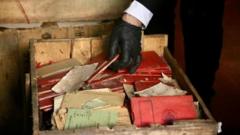Crates containing documents from Nazi Germany, long forgotten in the basement of Argentina's Supreme Court, were recently rediscovered during archival organization efforts. These documents, sent from the German embassy in Tokyo, reached Argentine shores on June 20, 1941, packed inside 83 diplomatic pouches aboard a Japanese steamship. The haul was intercepted by Argentine customs officials, who acted on suspicions arising from the unusual nature of the shipment.
While sorting through wooden champagne crates, the workers stumbled upon material that promotes Adolf Hitler's ideology within Argentina during World War II. Upon uncovering the materials, court officials quickly secured the crates and invited experts from the Buenos Aires Holocaust Museum to help create an inventory of their potentially sensitive contents.
Historical significance lies within the documents, which may provide valuable insights into Nazi financial networks and international relationships. Information so far indicates the shipment had been misrepresented as "personal effects" by the German embassy, prompting the customs officials to raise their suspicions and ultimately leading to the random opening of five of the pouches.
These actions sparked an investigation by the Argentine foreign minister, who feared the materials could compromise the nation’s neutral position during the war. The German embassy requested the return of the unopened pouches, but by September 1941, an Argentine judge ordered their seizure.
Despite a decision concerning their fate being expected from the Supreme Court, it reportedly took until 1944 for any significant action to take place when Argentina severed ties with the Axis powers. Consequently, the crates lingered in obscurity. The historical context intensifies as Argentina, under Juan Perón, later became known as a sanctuary for numerous high-profile Nazi figures, including Adolf Eichmann and Josef Mengele.
In acknowledgment of this dark chapter in its history, President Fernando de la Rúa publicly apologized in 2000 for Argentina's role in sheltering Nazi war criminals. The rediscovery of these documents may shed further light on Argentina's complex post-war legacy in relation to Nazi ideology.



















